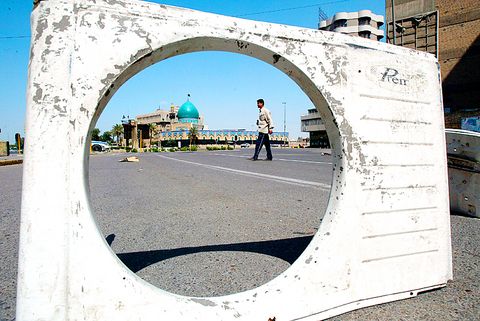Three months after a landmark election, Iraq's new parliament convened for the first time yesterday amid worsening communal violence and little sign of a deal on a government of national unity.
But the inaugural session lasted just 40 minutes and was adjourned after all 275 members of the national assembly were collectively sworn in.
Adnan Pachachi, 83, who as eldest member presided over the new assembly, said the session would adjourn until political parties could agree on who was to be elected speaker.

PHOTO: AP
"It has been decided to leave the session open pending political agreement on the designation of a speaker and his two deputies," said Pachachi, a former foreign minister.
Political parties remain deadlocked in their talks on forming a national unity government after the Dec. 15 election to choose the first full-term parliament following the US-led war that ousted former president Saddam Hussein in 2003.
"It is difficult to chose a new speaker and his deputies until a deal is reached on the whole government package," Hajem al-Hassani, the outgoing speaker, said in a televised interview.
The streets of Baghdadl were eerily quiet with vehicle traffic barred to keep car bombers at bay, while police and army units multiplied their checkpoints across the city. The 275 members of parliament met behind blast walls and razor wire in Baghdad's fortified Green Zone.
The government told civil servants to take a holiday and many other residents bunkered down at home, fearing attacks by insurgents bent on proving the caretaker government cannot guarantee security. Most shops remained closed.
Iraq's new parliament will again be dominated by the Shiite United Iraqi Alliance which can count on the support of 130 members of parliament.
The Kurdish coalition has 53 seats, while various Sunni parties control at least 55 seats. Secular-based and minority parties hold the remaining seats.
President Jalal Talabani suggested on Wednesday that the long awaited Cabinet should be ready by the end of this month, a conclusion deemed overly optimistic by rival politicians.
Outgoing Prime Minister Ibrahim Jaafari told state TV that forming the Cabinet would take a little longer: "I think a month is enough to form a government, if we keep to the Constitution."
Other politicians, however, note that deep gulfs remain on many key issues, including the Shiite choice of Jaafari to remain prime minister.
"I don't expect to see a new government before May," said one participant in the leaders' conference, Hassan Shumari, from the Shiite United Iraqi Alliance.
Deadly violence erupted in Halabja when Iraqi security forces fired into a crowd of Kurds rioting on the anniversary of Saddam's gas attack on the Kurdish town.
A 14-year-old boy was killed and six demonstrators in the clashes as some 7,000 protesters, including relatives of the 5,000 victims of the March 17, 1988 aerial attack, set up road blocks, attacked government offices and set fire to a memorial built to honor the dead.
Meanwhile, police overnight found 25 corpses that had been dumped in different parts of Baghdad, an official said.
also see story:
Milosevic and Saddam in the dock: A farce

A feud has broken out between the top leaders of the far-right Alternative for Germany (AfD) party on whether to maintain close ties with Russia. The AfD leader Alice Weidel this week slammed planned visits to Russia by some party lawmakers, while coleader Tino Chrupalla voiced a defense of Russian President Vladimir Putin. The unusual split comes at a time when mainstream politicians have accused the anti-immigration AfD of acting as stooges for the Kremlin and even spying for Russia. The row has also erupted in a year in which the AfD is flying high, often polling above the record 20 percent it

Philippine President Ferdinand Marcos Jr yesterday vowed that those behind bogus flood control projects would be arrested before Christmas, days after deadly back-to-back typhoons left swathes of the country underwater. Scores of construction firm owners, government officials and lawmakers — including Marcos’ cousin congressman — have been accused of pocketing funds for substandard or so-called “ghost” infrastructure projects. The Philippine Department of Finance has estimated the nation’s economy lost up to 118.5 billion pesos (US$2 billion) since 2023 due to corruption in flood control projects. Criminal cases against most of the people implicated are nearly complete, Marcos told reporters. “We don’t file cases for

Ecuadorans are today to vote on whether to allow the return of foreign military bases and the drafting of a new constitution that could give the country’s president more power. Voters are to decide on the presence of foreign military bases, which have been banned on Ecuadoran soil since 2008. A “yes” vote would likely bring the return of the US military to the Manta air base on the Pacific coast — once a hub for US anti-drug operations. Other questions concern ending public funding for political parties, reducing the number of lawmakers and creating an elected body that would

‘ATTACK ON CIVILIZATION’: The culture ministry released drawings of six missing statues representing the Roman goddess of Venus, the tallest of which was 40cm Investigators believe that the theft of several ancient statues dating back to the Roman era from Syria’s national museum was likely the work of an individual, not an organized gang, officials said on Wednesday. The National Museum of Damascus was closed after the heist was discovered early on Monday. The museum had reopened in January as the country recovers from a 14-year civil war and the fall of the 54-year al-Assad dynasty last year. On Wednesday, a security vehicle was parked outside the main gate of the museum in central Damascus while security guards stood nearby. People were not allowed in because